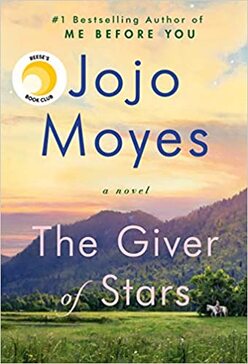2. Were these female change-makers for real, or is the author projecting current issues onto the past? (Issues like Margery's Cherokee heritage, Bennett's possible homosexuality, treatment of African-Americans, environmentalism, education of women, and even the idea of vulnerability - p.166)
3. Is Alice really as impulsive and lacking self-awareness as people say? Or is she just everyone's scapegoat? How does her ability to articulate her thoughts (to Van Cleve, to the Pastor) influence how you view her? 4. Who is the heroine of the story -- Margery or Alice -- and why? 5. What do you make of the title? Does this really encapsulate the story? (The Giver of Stars by Amy Lowell: "Hold your soul open for my welcoming. / Let the quiet of your spirit bathe me / With its clear and rippled coolness, / That, loose-limbed and weary, I find rest, / Outstretched upon your peace, as on a bed of ivory." (154) 6. What is the real history of the packhorse librarians? (Wikipedia: One WPA-funded project, the Pack Horse Library Project, mainly employed women to deliver books to rural areas in eastern Kentucky.[43] Many of the women employed by the project were the sole breadwinners for their families.) 7. The back cover of the hardcover copy highlights the conversation between Alice and Margery where Alice confides that she feels trapped. Is "feeling trapped" or getting out of a trap (whether due to mining, classism, racism, sexism) the main theme of the book? And if so, what are we supposed to gather from the way the characters solve their problems? 8. What was up with how Annie treated Alice? 9. Alice learns to shoot a gun and is "no longer afraid", but was she ever afraid? What did her fear look like, and how did Alice change? (228) 11. There's a lot of talk about Bennett's mother in the beginning of the book, but that sort of trails off until the doll incident. What type of woman do you think Bennett's mother was really like? How do you think Van Cleve treated her? 12. Have any of your read Flight Behavior by Barbara Kingsolver? The flood (p.246) reminded me of the ending of Kingsolver's book. There are a lot of similar issues between them -- the setting, environmentalism, women's rights... Did Moyes' book remind you of other titles? 13. Was Margery's decision to give up her daughter and give up on strategy for the trial in line with her character or not, and why? 14. Why did Alice apologize to Bennett in the store? (353) 15. At Margery's trial, why did the townsfolk insist on calling Clem McCullough "a good man who set out to do a good deed"? (370) Why did the prosecution not question the daughter's story that to us was so clearly invented? 16. Where did the men get off without a trial? (Clem McCullough should have been on trial for rape of his daughter and assault of Margery; Geoff Van Cleve for hitting Alice and for negligence and other offenses regarding his mine.) 17. What was up with Bennett? 18. Did Peggy deserve to be laughed at in the end? Or was this yet another example of women fighting each other and the men getting off without a trial? (Like how Annie sets herself against Alice.) 19. Aren't you curious about Married Love by Dr. Maria Stopes? It's available on Kindle. Amazon quotes Wikipedia in describing the text and its publishing history: "Married Love or Love in Marriage is a book written by Dr. Marie Carmichael Stopes, first published in March 1918 by a small publisher, after many other larger publishers turned her down because of the content. It rapidly sold out, and was in its sixth printing within a fortnight. The US Customs Service banned the book as obscene until April 6, 1931, when Judge John M. Woolsey overturned that decision. Woolsey is the same judge who in 1933 would lift the ban on James Joyce's "Ulysses", allowing for its publication and circulation in the United States of America. It was the first book to note that women's sexual desire coincides with ovulation and the period right before menstruation. The book argued that marriage should be an equal relationship between partners. Although officially scorned in the UK, the book went through 19 editions and sales of almost 750,000 copies by 1931." Follow-up: Good morning, A huge thank you to Lilli for hosting us last night -- it was so good to see your silhouetted faces from across the radiant heat of the solo stove (we all highly recommend this portable product). What an incredible treat. (But just FYI, those cans of rose are apparently equivalent to 2.5 glasses of wine... I apologize if my comments got a little loud there -- I went to sleep with my head spinning!) It'd be great to meet in person again next month if the weather holds, but I feel torn about that because it would also be good to see a larger group at our FOUR YEAR ANNIVERSARY of book club! We'll be in touch about location as the date approaches. Our club began with a discussion of Yaa Gyasi's Homegoing, so In celebration of our upcoming birthday, let's discuss her brand new novel Transcendent Kingdom in October! This book choice will probably involve modest expense because there are zillions of holds at the library, but thank you to Lisa for the title suggestion! Hope to see you there!
0 Comments
|
Authors
The Tipsy Mamas' Book Club is co-hosted by Corinne Foster and myself, though the spirit of our discussions is flavored by many readers. Archives
November 2022
|
